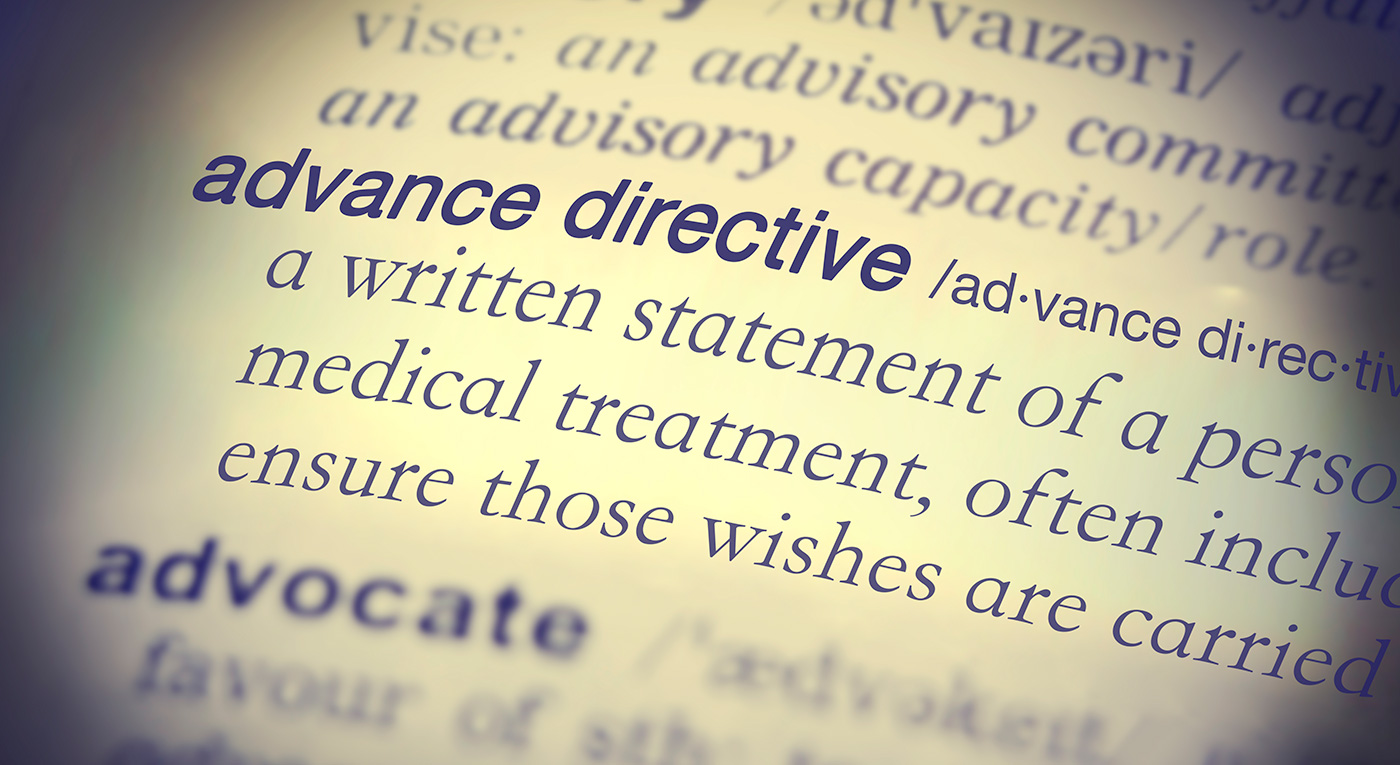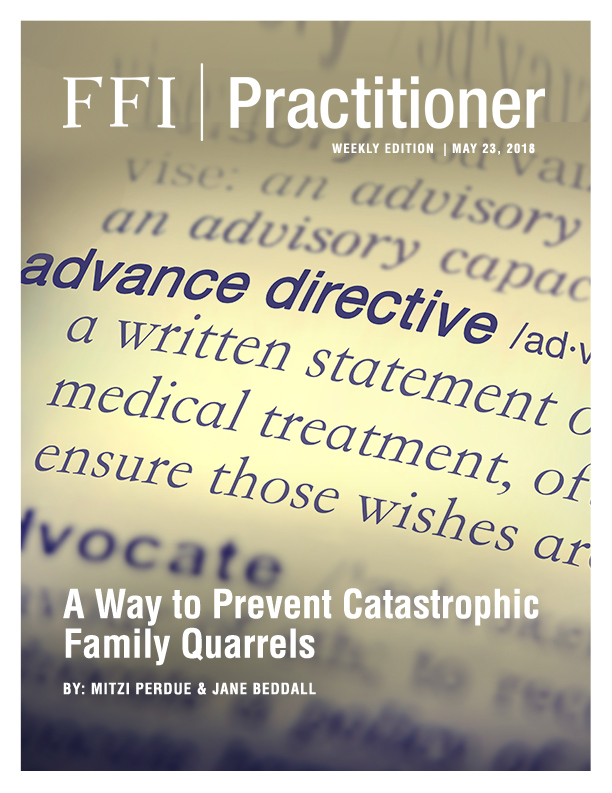Practice Insights
A Way to Prevent Catastrophic Family Quarrels
Weekly edition • May 23, 2018


From FFI Practitioner
When an unexpected disaster strikes, and family members are unaware of a patriarch or matriarch’s end-of-life care wishes, then decisions about how to proceed can create deep-seated and long-lasting conflict that can destroy a family business. This week’s contributors, Mitzi Perdue and Jane Beddall share insights from their experiences and advice about how to address this sensitive subject with your clients.
Few things are more threatening to the survival of a family business than a serious family quarrel. The good news is, you can help prevent at least one of the predictable sources of family-destroying conflict.
We’re talking end-of-life care. When family members don’t know a patriarch or matriarch’s wishes, then decisions about what kind of care to provide can generate white-hot, lasting conflict.
To see how this can damage or even destroy a business family, take the case of Suzette Stephens. Her name and the details involved are disguised, but the situation is real.
What Can Happen Without an Advance Directive
For almost 20 years, Stephens had been aware that she needed to let people know her wishes for end-of-life care. She even told family members that she was going to put her wishes in writing. However, as is all too human, she simply never got around to it.
Then, at age 71, she was in a car accident and ended up in the ICU. The prognosis was as dire as could be, including permanent brain damage.
Her children, Allyson and Robert, had to confront an appalling choice, one that would be difficult under any circumstance. In the hospital setting, under greater stress than they had ever endured in their lives, they needed to make an immediate life-and-death decision about whether to hook their mother up to a ventilator.
Allyson couldn’t bear to see her beloved mother die. As she wept inconsolably, she pleaded with everyone who could hear, “Please, please, do everything you can!”
Robert had an opposite reaction. The idea of his mother hooked up for months to machines that kept her body alive but that could never change the outcome, horrified him. He believed that the ventilator meant his beloved mother would have a long, slow, unnatural death. His conscience told him to let his mother die in peace.
It’s not clear why, but Robert won this fight. The ventilator was not used, and Suzette Stephens died the next morning.
The aftermath tore the family apart. Allyson’s attitude toward her brother was, “You killed Mother!” Robert resented beyond all imagining that he, in trying to do what he felt was best for his mother, was now hated by his sister.
Sidebar

FFI Practitioner Article
by: Mitzi Perdue
Many of your clients may have a ticking economic time bomb in their portfolios, one that they are completely unaware of.
The Tragedy Didn’t End There
There are several tragic aspects to what happened next, but one of them is, in this kind of conflict, no compromise is possible. Suzette was dead. The two children couldn’t undo that. It wasn’t a situation in which they could split the difference or compromise.
Within a year, the antagonism became so intractable that the two were no longer able to work together. They couldn’t even speak to each other.
That meant selling the family business. It was a fire sale because they couldn’t get their act together enough to present a united front to buyers. Their competitors were only too happy to pick them off.
The fact that it was irremediable was tragic, but possibly even more tragic, the whole thing could have been avoided. If only Stephens had let her wishes be known while she was still able to make her own decisions.
Help Your Clients Avoid This Preventable Tragedy
Although cultural and legal norms vary throughout the world, some points are universal. As advisers, we need to think about end-of-life care and how to prevent or minimize future destructive family conflict.
Some basic steps for addressing the practical challenges include:
- Get your client’s advance directive in place as soon as possible. In this case, done is better than perfect. Your client can always do some fine-tuning later.
- If you are not an attorney, have your client work with an attorney. Different states have different requirements, and you want your client’s wishes to be legally binding wherever they live.
- Have your client designate someone who will have a medical power of attorney (or health care proxy/agent/representative/surrogate). That person will be an advocate in case the client is not able to express his or her wishes on end-of-life care. That designee needs to be able to say, “I know what he/she wanted, and here it is in writing. We’re going to follow his/her wishes.”
- Have a backup in case the first designee is unable to perform this service. The designee could become incapacitated or could predecease your client.
- When choosing the designee, remember, the person who may seem to be the default option may be ill-equipped to carry out this important duty. For example, if a current spouse would struggle to carry out the client’s wishes, an adult child from a previous marriage may be better able to serve in this role.
- To minimize possibilities of conflict, encourage your client to have a conversation with loved ones ahead of time so they are clear about the client’s wishes. Let them know whether the client wants every measure taken or none or something in between. Also, let loved ones know who has been chosen to shoulder the responsibility of speaking for the client when the client cannot speak.
Your Client Now Has an Advance Directive. You’re Not Done.
Once your client has written his or her advance directive, an important but often overlooked consideration is that health emergencies can strike at any time. The directive therefore needs to be available at all times.
Too often an individual says, “I’ve got that covered: it’s in the family safe deposit box at the bank,” or “My lawyer has it.” But a car accident or a stroke may occur on a weekend, when the bank is closed, or the lawyer can’t be reached.
A decision may have to be made immediately, such as whether to intubate the patient or not. Once made, either way, the decision may be difficult or impossible to reverse.
The individual who has your client’s medical power of attorney (POA) should keep a pdf of your client’s advance directive on his or her smart phone. Other loved ones, especially the designated alternate, should do the same so that the advance directive is easily available at all times.
Individuals with a medical POA should also store the advance directive in the cloud. If clients travel to locations where internet service may be unavailable, they should carry paper copies of directives with them. Even if the person with the medical POA cannot be reached, the client will have the instructions close at hand.
When choosing the designee, remember, the person who may seem to be the default option may be ill-equipped to carry out this important duty.
Co-author Beddall herself experienced the need for this. Her mother had a severe stroke while at a nursing home and was immediately sent to the ER. When Beddall arrived at the hospital, she learned that the end-of-life document that the hospital had on file wasn’t the current one.
Fifteen years ago, when Beddall’s mother was younger and healthier, she had directed that if she were in an end-of-life situation, that her caregivers should do everything they could to save her.
However, in her later years, her wishes changed. The current, revised, advance directive stated that if she was in an end-of-life situation, she didn’t want any heroics. Instead, she wanted nature to take its course.
Of vital importance, her mother had discussed her current written wishes with her family. She had also let them know that she had appointed Beddall to speak for her when she could not speak for herself.
Beddall was fortunate that her husband could e-mail a pdf of the current advance directive to her smart phone, and she was able to share it with the hospital officials. Because of this, she was able to carry out one of her mother’s most deeply felt wishes.
Today, Beddall stores her own advance directive on her own phone. She also made sure that this document is available on the phones of her health care representative and alternate.
In the case of your client, a discussion of advance directives may be difficult and unsettling. Further, no one will ever know how much pain and dissension you will have prevented by doing this.
Still, if the experience of others counts, there’s a good chance that a short investment of time and effort on your part could save a lifetime of family pain and dysfunction for your client.
About the contributors

Mitzi Perdue is a professional public speaker and author of How to Make Your Family Business Last: A Treasury of Checklists, Templates, Resources, and Tips. She is a frequent contributor to FFI Practitioner. Mitzi can be reached at mitzi@mitziperdue.com.

Jane Beddall, CFBA, CFWA is a mediator and practiced law for a number of years, before founding Dovetail Resolutions in 2006 She specializes in conflict prevention and resolution. Jane can be reached at jb@dovetailresolutions.com.
Related Article
If you enjoyed this article, view the related article that examines two sides of one issue – competency.

